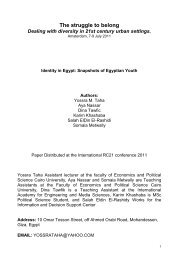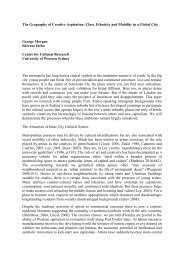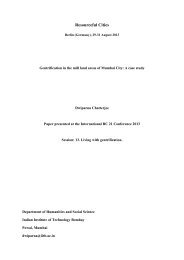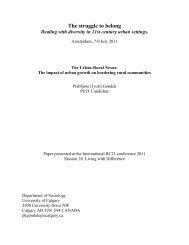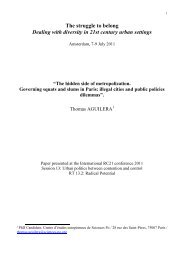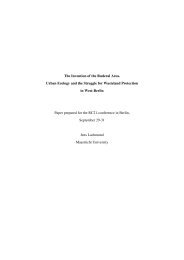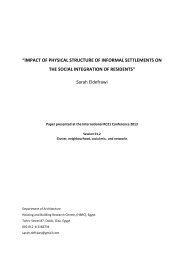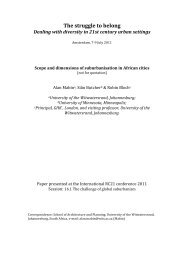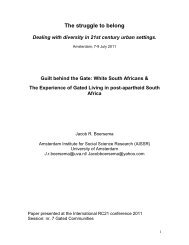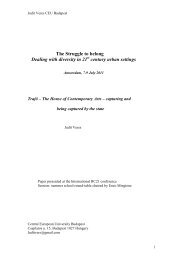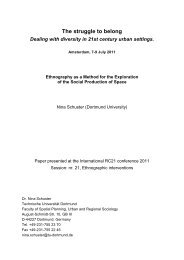Fragmentation as a threat to social cohesion - RC21 ORG ...
Fragmentation as a threat to social cohesion - RC21 ORG ...
Fragmentation as a threat to social cohesion - RC21 ORG ...
You also want an ePaper? Increase the reach of your titles
YUMPU automatically turns print PDFs into web optimized ePapers that Google loves.
and <strong>social</strong> transformation processes taking place in the so called “Second Modernity”<br />
(liberalization, deregulation, privatization of markets and a polarizing division of labor<br />
<strong>as</strong> a consequence of global capitalism, etc.) (Scholz 2004, 7). Within this<br />
perspective, fragmentation appears <strong>as</strong> a new form of segregation on a larger scale. It<br />
replaced the term polarization, due <strong>to</strong> the new complexity of socio-spatial, <strong>as</strong> well <strong>as</strong><br />
functional units of varying size, which are being established in the midst of a<br />
differentiated environment, often hermetically sealing themselves off against such<br />
dissimilar surroundings. In contr<strong>as</strong>t <strong>to</strong> the term 'polarization', which points <strong>to</strong> the<br />
juxtaposition of the irreconcilable, 'fragmentation' represents the recognition of<br />
contr<strong>as</strong>ting, but highly interwoven elements.<br />
These variations are mostly related <strong>to</strong> the question whether fragmentation is <strong>to</strong> be<br />
seen <strong>as</strong> opposed <strong>to</strong> integration (which generally is believed <strong>to</strong> be a “good” thing) and<br />
even questioning <strong>social</strong> <strong>cohesion</strong>, or if fragmentation leads <strong>to</strong> different, multiple forms<br />
of integration that may no longer be described solely in the notions of <strong>social</strong> and<br />
systemic integration resting upon – <strong>as</strong> most sociological concepts – nationally formed<br />
societies. The central term for describing new forms of integration is that of networks<br />
and it is closely linked <strong>to</strong> debates on the so-called information society, b<strong>as</strong>ed on new<br />
techniques and modes of communication. Within the latter, emph<strong>as</strong>is is being laid on<br />
its ambivalence between convergence, <strong>as</strong> “a similarity and incre<strong>as</strong>ing unity of<br />
experience” and fragmentation, <strong>as</strong> “a growing differentiation of experience” (Ludes<br />
2008, 10). Where<strong>as</strong> this view emph<strong>as</strong>izes individual experience <strong>as</strong> b<strong>as</strong>ed on modes<br />
of communication, the so-called network society thesis (C<strong>as</strong>tells 2001 [1996]) refers<br />
<strong>to</strong> a “widening gap between connected and unconnected (or disconnected) places<br />
and people” (Coutard 2008, 1816). Even though the term 'network' itself seems <strong>to</strong><br />
elude spatial fixes, within this conceptualization it is closely linked <strong>to</strong> places by<br />
technical and locally concentrated communication infr<strong>as</strong>tructures. This notion h<strong>as</strong> <strong>to</strong><br />
be distinguished <strong>to</strong> a certain extent from the b<strong>as</strong>ic concept of <strong>social</strong> networks which<br />
conceptualizes interrelations between individuals or <strong>social</strong> ac<strong>to</strong>rs and creates a<br />
significant world of its own without depending on interrelations with its surrounding<br />
world (Fuchs 2010, 56). In C<strong>as</strong>tell's network society, the network is b<strong>as</strong>ed on global<br />
financial flows, formed by nodes like share markets, political institutions, local<br />
production units and service centers and their underlying communication<br />
infr<strong>as</strong>tructure (C<strong>as</strong>tells 2001 [1996], 528). Where<strong>as</strong> the network emph<strong>as</strong>izes global<br />
connection, this new spatial arrangement produces local disconnection, a tendency<br />
seen most vigorously in so called mega-cities by C<strong>as</strong>tells (ibid., 460).<br />
The opposition between fragmentation and integration is central <strong>to</strong> analyses of<br />
globalization. At first sight, the globalization thesis links much more <strong>to</strong> the promise of<br />
a largely integrated world and the hypothesis of a world society, b<strong>as</strong>ed not only on<br />
economic relations, but also on political and cultural convergences, enabled by<br />
communication technologies and greater mobility, thereby eliminating obstacles<br />
posed by (geographical, spatial) distances. It is, thus, the grand meta-narrative that<br />
emerges simultaneously <strong>to</strong> the claim of the incredulity of such by postmodernist<br />
theorists (Harrison 2003, 13). Dealing with this apparent paradox (Menzel 1998) h<strong>as</strong><br />
become one of the big t<strong>as</strong>ks in globalization studies. There are, at le<strong>as</strong>t, two sides <strong>to</strong><br />
the opposition of fragmentation and integration within globalization analyses: One<br />
refers <strong>to</strong> the fact that “fragmentation is not used <strong>as</strong> a counter-argument or <strong>as</strong> a sign<br />
of the limits of the globalization processes. Rather, it is used <strong>to</strong> explain the dynamics<br />
of these processes. The more connected and consolidated the global network<br />
becomes, that is, the more integrated the 'globalized world', the more fragmented<br />
and disconnected becomes the 'non-globalized world' – all those countries and cities<br />
4 Deffner, Hoerning: <strong>Fragmentation</strong> <strong>as</strong> a Threat <strong>to</strong> Social Cohesion?




